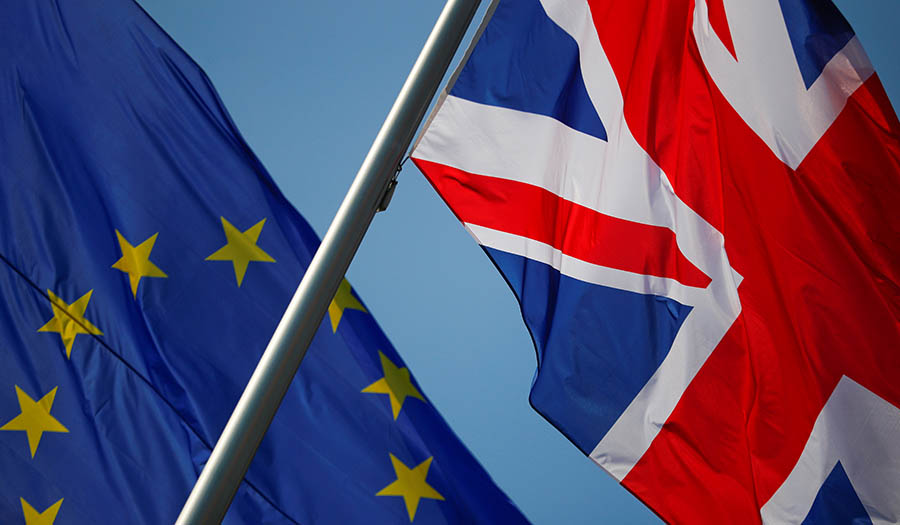 Reuters/Hannibal Hanschke
Reuters/Hannibal Hanschke
World News Desk
Learn the why behind the headlines.
Subscribe to the Real Truth for FREE news and analysis.
Subscribe NowLONDON (Reuters) – The European Union told Britain on Monday that there would be no trade deal if it tried to tinker with the Brexit divorce treaty, raising the prospect of a tumultuous end-of-year finale to the saga.
In yet another twist to the four-year saga since Britain voted to quit the EU, Prime Minister Boris Johnson’s government was reported to be planning new legislation to override parts of the Brexit Withdrawal Agreement it signed in January.
That could jeopardize the whole treaty and create frictions in British-ruled Northern Ireland, where special arrangements had been made to avoid a hard border with Ireland to the south that could be detrimental to the 1998 peace agreement which ended three decades of conflict in the province.
“I trust the British government to implement the Withdrawal Agreement, an obligation under international law & prerequisite for any future partnership,” said Ursula von der Leyen, head of the EU executive.
“Protocol on Ireland/Northern Ireland is essential to protect peace and stability on the island & integrity of the single market.”
Britain said it would honor the deal and was simply offering clarifications to avoid any future legal difficulties.
But the Financial Times newspaper cited three people as saying the proposed internal market bill was expected to “eliminate the legal force of parts of the withdrawal agreement” in areas including state aid and Northern Ireland customs.
EU diplomats were aghast, cautioning that such a step, leaked on the eve of new talks in London, would tarnish Britain’s global prestige and heighten chances of a tumultuous final disentangling from the bloc on December 31.
“Reasonable Steps”
Britain said it was committed to the divorce deal.
“We are taking limited and reasonable steps to clarify specific elements of the Northern Ireland Protocol in domestic law to remove any ambiguity and to ensure the government is always able to deliver on its commitments,” a spokesman for Mr. Johnson said.
It could not allow the peace process or the internal British market to inadvertently be compromised, he said.
Britain left the EU on January 31 but talks on a new trade deal before the end of a status-quo transition arrangement in December have snagged on state aid rules and fishing.
London has set a deadline of October 15 to strike a deal.
“If we can’t agree by then, then I do not see that there will be a free trade agreement between us, and we should both accept that and move on,” Mr. Johnson said on Monday.
Prime Minister Johnson and French President Emmanuel Macron agreed on Monday that talks on a Brexit deal needed to make progress this month and reach a conclusion quickly, Mr. Johnson’s office said.
European diplomats said Britain was playing a game of Brexit chicken by threatening to collapse the process and challenging Brussels to compromise first. Some fear Mr. Johnson may view a no-deal exit as useful distraction from the coronavirus crisis.
Some Brexit-supporting members of the ruling Conservatives oppose the withdrawal agreement as threatening British independence even if the two sides secure future trade ties.
“Gamesmanship”?
There was surprise and anger on both sides of the Irish border and in Brussels at the reported plan to undermine the withdrawal pact.
Irish Foreign Minister Simon Coveney asked: “Is this political gamesmanship or is there really a piece of legislation that’s going to emerge this week, which is contrary to the withdrawal agreement? We’ll have to wait and see.”
Without a deal, about $900 billion annual trade between Britain and the EU could be thrown into uncertainty, including rules on everything from car parts and medicines to fruit and data.
EU chief negotiator Michel Barnier acknowledged anxiety but declined to comment on the FT report. “I remain worried…the negotiations are difficult, because the British want the best of both worlds,” he told France Inter radio.
- Personals
- PROPHECY
 2020: Have We Reached the “Beginning of Sorrows”?
2020: Have We Reached the “Beginning of Sorrows”?


